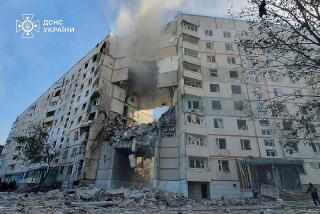Georgia Retakes Port With Apparent Russian Help
- Share via
TBILISI, Georgia — Government troops recaptured the Black Sea port of Poti on Monday in a significant reversal for rebels loyal to former President Zviad Gamsakhurdia, amid indications that Russian troops played an important role in the victory.
The retaking of the port, which is the main entry point for food and other essential supplies for Georgia, was a major gain for Georgian leader Eduard A. Shevardnadze.
With the capture of Poti, the railway from the Black Sea to Tbilisi, the Georgian capital, and through to Armenia can now be reopened.
In an interview for national radio, Shevardnadze took a hard line against Gamsakhurdia, whom he blamed for Georgia’s loss last month of the breakaway province of Abkhazia.
“He is the black force,” the Georgian leader said, “a person responsible for the betrayal in Abkhazia, for the betrayal of Georgian unity.”
Gamsakhurdia’s troops, he said, “have two ways out: They can be destroyed or they can lay down their arms.”
The government capture of Poti is also meaningful for the role played by the Russians, who have been trying to enhance their influence on the territory of the former Soviet Union without becoming too directly embroiled in local conflicts.
There is mounting evidence that Russian troops provided Shevardnadze with concrete assistance for the first time since the Georgian leader, a former Communist Party chief here and a onetime Soviet foreign minister, returned to power in his native land.
“Russian troops tightened their grip on key installations in Poti just before Shevardnadze’s troops entered the town,” said a source close to the Georgian government. “The Russians did not fight, they simply made a show of strength, and the Zviadists (the rebels) had no choice but to pull out.
“The government offensive was planned by the Russians,” the source continued. “They gave Shevardnadze tanks, artillery and the men to operate them.”
Russian interests in the Caucasus region are manifest.
“The rendering of military aid to the Shevardnadze government is not pure charity,” said political analyst Yevgeny Kiselev on the Russian television news program “Itogi” this week. “A return to power by the notoriously anti-Russian-inclined Gamsakhurdia and his supporters would hardly be in the interests of the local Russian-speaking population.”
The Russian government so far has not conceded that it has even fulfilled a pledge to guard key transportation corridors in Georgia, an indication of the sensitivity of the Russian presence in the region.
A Defense Ministry spokesman in Moscow said Monday that the troops would not go into action until joined by military units from Georgia, Armenia and Azerbaijan, all with a vital interest in keeping the arteries open.
For all that, Russia’s clear support of Shevardnadze in the latest conflict is likely to end Gamsakhurdia’s bid to return to power.
More to Read
Sign up for Essential California
The most important California stories and recommendations in your inbox every morning.
You may occasionally receive promotional content from the Los Angeles Times.













